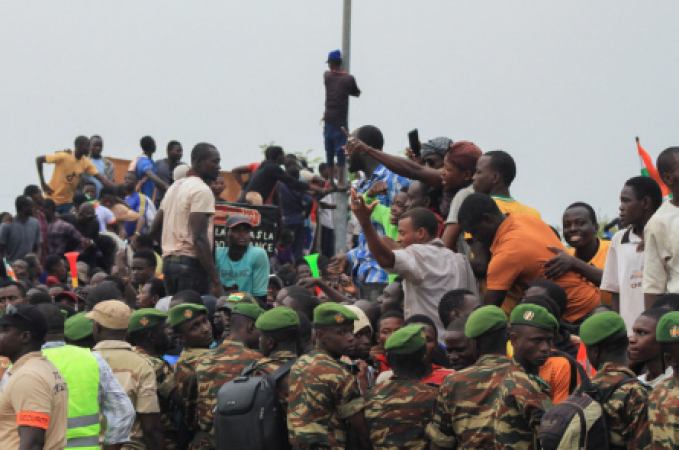
In a dramatic display of dissent, thousands of Nigerien citizens swarmed the streets of their nation on a recent Saturday, uniting in a resounding chorus against the recent coup d'état and echoing a fervent call for the departure of French troops from their homeland.
The sweeping protests, which unfolded in Niger's capital, Niamey, and other major cities, were largely characterized by non-violence, although sporadic confrontations did erupt between demonstrators and security forces.
The impassioned protesters voiced their discontent through chants, directing their ire towards the coup leaders while fervently advocating for the reinstatement of constitutional order.
Also Read: China's Economy Faces Most Significant Slowdown in 28 Years Amidst Lingering Lockdown Impact
However, their demands didn't stop there; a clear and forceful cry also resonated for the withdrawal of French troops, a contingent that had long been stationed in Niger to combat terrorism.
The turmoil that fueled these fervent demonstrations was ignited by a seismic event that unfolded on February 24. On that day, a cadre of soldiers led by Major Sadou Salou orchestrated a coup, wresting power from President Mohamed Bazoum. In the aftermath, Salou swiftly anointed himself as interim president, dissolving both the government and parliament.
This audacious coup attempt, which transgressed democratic norms, has elicited widespread condemnation from the international community.
Entities such as the United Nations, the African Union, and the European Union have all voiced their disapproval. France, whose military presence in Niger has long been a point of contention, also unequivocally condemned the coup, concurrently demanding the immediate release of President Bazoum and other detained officials.
The protests that gripped Niger are emblematic of a populace brimming with frustration and anger, exasperated by the coup and the sustained French military presence within the country.
For years, the French military has been stationed in Niger to assist in the ongoing fight against terrorism, a role that has consistently sparked debates about national sovereignty and the implications of foreign military intervention.
The February coup further amplified these sentiments, sparking not only anger at the seizure of power but also concerns regarding Niger's stability. The nation occupies a critical geographical position as a transit route for terrorists traveling between Mali and Nigeria, rendering its political stability pivotal to regional security.
Also Read: Controversial Move: US Considers Sending Depleted Uranium Munitions to Ukraine
These protests arrive at a crucial juncture for France, which faces mounting pressure to recalibrate its military presence in Africa. Recent years have borne witness to a series of coups and political turbulence in French-speaking countries across the continent, including Mali and Burkina Faso.
While the French government maintains its commitment to assisting Niger in its counterterrorism efforts, it is increasingly ensnared in a delicate dance between its security interests and the intensifying call for military withdrawal from the region.
The protests in Niger have only served to exacerbate this mounting pressure, underscoring the disquiet among the populace regarding the existing status quo.
The ultimate decision on whether France will withdraw its troops from Niger remains cloaked in uncertainty. While the French government asserts its dedication to bolstering Niger's counterterrorism efforts, the surge of protests underscores a palpable discontentment within the nation's borders.
In the realm of international politics, the Nigerien demonstrations echo a broader sentiment resonating across the African continent—a sentiment that questions the efficacy and implications of foreign military interventions.
These protests aren't merely isolated to one nation; they encapsulate a regional and continental debate over the role of external military forces in African affairs.
The colossal protests that have swept through Niger represent a nation at a crossroads, grappling with the repercussions of a coup and grappling with the presence of foreign troops on its soil.
Also Read: Escalating Tensions: Iran Accuses Israel of Plotting to Sabotage Missile Program
These events are emblematic of broader questions surrounding the dynamics of sovereignty, security, and foreign intervention on the African continent.
Whether these demonstrations will compel France to reassess its military footprint in Niger remains to be seen, but they undeniably reflect a population's impassioned plea for change and an earnest desire for self-determination in charting their nation's future.